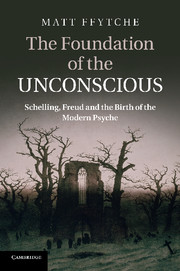Book contents
- Frontmatter
- Contents
- Acknowledgements
- Introduction: the historiography of the unconscious
- Part I The subject before the unconscious
- 1 A general science of the I: Fichte and the crisis of self-identification
- 2 Natural autonomy: Schelling and the divisions of freedom
- Part II The Romantic unconscious
- Part III The psychoanalytic unconscious
- Bibliography
- Index
2 - Natural autonomy: Schelling and the divisions of freedom
Published online by Cambridge University Press: 05 December 2011
- Frontmatter
- Contents
- Acknowledgements
- Introduction: the historiography of the unconscious
- Part I The subject before the unconscious
- 1 A general science of the I: Fichte and the crisis of self-identification
- 2 Natural autonomy: Schelling and the divisions of freedom
- Part II The Romantic unconscious
- Part III The psychoanalytic unconscious
- Bibliography
- Index
Summary
Every organic product carries the reason of its existence in itself, for it is cause and effect of itself.
There are no native sons of freedom.
As with Fichte, the issue of freedom cuts across the whole of Schelling’s work and its innumerable frames of reference. The Ideas for a Philosophy of Nature (originally published in 1797, hereafter Ideas) begins with the statement, ‘Philosophy is throughout a work of freedom’; his more Fichtean work The System of Transcendental Idealism early on asserts that ‘freedom is the one principle on which everything is supported’; in 1809 he published his Philosophical Inquiries into the Nature of Human Freedom; and, according to Michael Vater, all of Schelling’s later work, from the 1815 Ages of the World to the lectures on mythology and religion of the 1840s to 1850s, show him to be ‘in search of a principle of freedom and actuality not confined to and determined by reality as merely conceived’.
In this light, the long-standing Anglo-American tendency to associate Schelling primarily with the philosophy of art or a poetic vision of nature, wrongly separates him from the ideological anxieties of liberalism and nineteenth-century social philosophy. As with Fichte, the question that plagued Schelling was once more how to fit individuality and unity, freedom and structure together into a convincing post-Enlightenment philosophy of man. As his biographer Gustav Plitt noted, ‘the goal of his whole life’s work was the ethical renewal of the people’. When Schelling received a summons to Berlin in the 1840sto take up the chair of philosophy which Hegel had occupied at his death ten years earlier, the Prussian government hoped he would be able to stem the threatening rise of Hegelianism amongst the Berlin students. However, the announcement of his lecture course on ‘The Philosophy of Revelation’, for all its orthodox and Christian overtones, in fact sent out a message to the youthful intelligentsia of Europe that Schelling had something epoch-making to reveal. He now promised to unveil the ‘positive’ philosophy of actuality, which the previous phases of idealism had only transcendentally critiqued. It was this expectation that drew a spectacular array of auditors, including the young Kierkegaard, Friedrich Engels, Jakob Burkhardt and Mikhail Bakunin, all of them hoping to hear how idealism’s philosophy of freedom could be made real.
- Type
- Chapter
- Information
- The Foundation of the UnconsciousSchelling, Freud and the Birth of the Modern Psyche, pp. 75 - 96Publisher: Cambridge University PressPrint publication year: 2011



